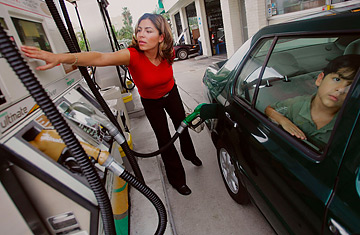
A motorist fills up at a pump in Miami.
In one respect, not too much has fundamentally changed since then; China's economy is still racing along, car bombs are still exploding in Baghdad and Americans are still hooked on their gas-guzzling SUVs. But one crucial thing is changing: oil prices are actually falling. Crude oil futures fell below $50 a barrel Thursday afternoon, their lowest level since May of 2005. Gasoline prices are down too, to around $2.25 a gallon on average, from a peak of just over $3 last summer. It's all good news for the economy, since lower energy prices traditionally help tame inflation and could ease pressure on the Federal Reserve to raise interest rates. Paying less at the pump leaves motorists with more cash to spend on everything from movies to microwaves. And no one is happier than the airlines, whose cost of jet fuel has plummeted 11.5% in the last month alone.
So if so much has stayed the same, why haven't oil prices? Analysts say there are a variety of reasons, starting with the weather. The current deep-freeze in the Midwest aside, this winter has been unseasonably warm, curbing demand for heating oil. "A third of the winter season is over and we haven't seen any normal consumption patterns on the East Coast," says Irene Haas, an energy analyst with Canaccord Adams in Houston. Haas also points out that an additional 1.5 million barrels of daily oil production is slated to kick in this year from countries such as Angola, Azerbaijan, Brazil and Canada; that much new oil from non-OPEC nations hasn't hit the global pool in three years, and it should easily counteract the production cuts OPEC is planning. The extra capacity also means oil traders may be less inclined to bid up prices at the first signs of political turmoil in hot spots around the world. "What's changed is the perceived cushion we have to respond to political events," she says.
None of this is welcome news for oil companies, of course. While they're still raking in billions in profits, the stock prices of the majors, from ExxonMobil to Chevron, have declined in recent weeks, since lower oil prices will invariably translate to lower corporate revenues. The silver lining: oil companies may be able to cut their costs by spending less for field services and drilling projects, helping shore up their bottom lines. "When pricing is weaker you tend not to get as aggressive with drilling," Haas says. Nonetheless, she adds, "it will be a challenging year" for the industry.
The longer-term problem for oil companies is that the wild swings in petroleum prices are spooking the auto industry. After years of paying lip service to improving fuel economy, automakers finally seem intent on producing alternatives to the internal combustion engine. That was apparent at the Detroit auto show this month, where GM and Ford unveiled advanced battery-powered concept cars such as the Chevrolet Volt and Ford Airstream. Even if the Detroit automakers don't build those models — and they probably won't — they know they need to get higher-mileage vehicles on the road, be it hybrids, hydrogen fuel cell vehicles, next-generation diesels or some combination of them all. If they don't, they'll lose another generation of American drivers to the Japanese, whose hybrid technology alone has a five-year headstart on Detroit's. For the petroleum industry, it's one more unwelcome sign that America just may get serious about kicking its oil habit.
